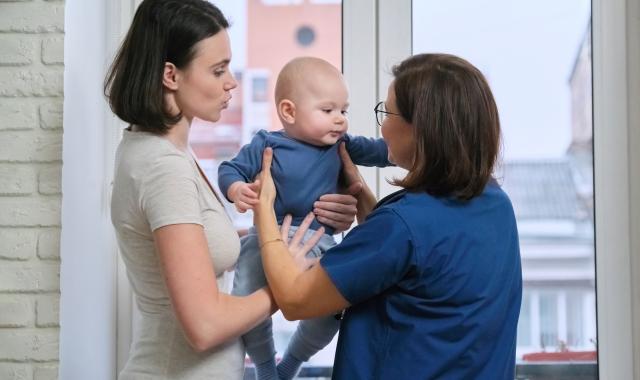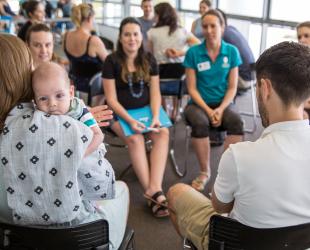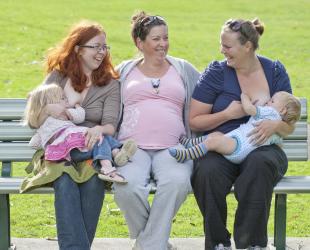Breastfeeding isn’t just up to mums! Support from everyone is vital to success
World Breastfeeding Week is celebrated each year from 1 to 7 August. This year Jess talks to Jennifer Hurrell, volunteer breastfeeding counsellor and community educator, about how everyone has a shared role in protecting breastfeeding in the warm chain of breastfeeding support.

Podcast episode
Podcast information
Breastfeeding isn’t just up to mums! Support from everyone is vital to success.
World Breastfeeding Week is celebrated each year from 1 to 7 August. This year Jess talks to Jennifer Hurrell, volunteer breastfeeding counsellor and community educator, about how everyone has a shared role in protecting breastfeeding in the warm chain of breastfeeding support.
Information discussed in this episode:
- World Breastfeeding Week information and celebrations
- Watch our World Breastfeeding Week 2021 presentation
- Local ABA support groups
- Purchase our booklet, Breastfeeding: supporting the new mother
- Partner support, the breastfeeding partnership
- Visit ABA's Workplace portal for information for employers and employees
- What is a Lactation Consultant?
- Health Professional membership options and information
Credits:
This episode is presented Jennifer Hurrell and Jessica Leonard.
Audio editing and additional reporting by Jessica Leonard. Show notes by Belinda Chambers. Transcription by Madina Hajher. Produced by Belinda Chambers, Jessica Leonard and Eleanor Kippen.
[Music]
JENNIFER: Being a breastfeeding counsellor and being there for mums when they’re struggling and they need support, is such a privilege.
JESS: Welcome to Breastfeeding … with ABA, a podcast brought to you by volunteers from the Australian Breastfeeding Association. Breastfeeding … with ABA is a podcast about breastfeeding, made by parents for parents. In this episode we’ll be talking about World Breastfeeding Week and this year’s theme, ‘Protect Breastfeeding: a shared responsibility’.
We’re recording this podcast in different parts of Australia. We acknowledge the traditional custodians of the land on which we are recording and on which you are listening to this podcast. We pay our respects to elders, past, present and emerging and any Indigenous people who may be listening today. We also acknowledge the long history of oral storytelling on this country and of women supporting each other to learn to feed their babies.
My name’s Jess and I’m a breastfeeding counsellor with the Australian Breastfeeding Association and a mum of two kids. I’m speaking to you from the lands of the Wurundjeri people of the Kulin nation in the northern suburbs of Melbourne.
JENNIFER: My name is Jennifer and I’m a breastfeeding counsellor and community educator with the Australian Breastfeeding Association, and a mum of two kids. I’m speaking to you today from the land of the Djadjawurrung people of the Kulin nation in North Central Victoria.
[Music fades]
JESS: So, thanks so much for chatting with me today, Jennifer, perhaps you can just tell everybody a little about what is World Breastfeeding Week?
JENNIFER: Sure, so World Breastfeeding Week is a week that we celebrate every August, the 1st to the 7th, so this year it’s Sunday 1 August to Saturday 7 of August. And World Breastfeeding Week really celebrates breastfeeding. This year, World Breastfeeding Week has a theme of ‘Protect Breastfeeding: a shared responsibility’ and it’s really about acknowledging how breastfeeding contributes to the survival and health and wellbeing of everyone. The theme this year doesn’t just look at the support for the individual but also how breastfeeding needs to be supported as a public health issue at all levels. Building back, particularly after COVID-19 pandemic, is a really important theme that’s being focused on this year. The idea is to create support for breastfeeding that includes health systems, workplaces and communities of all levels of society.
JESS: Jennifer, this year for World Breastfeeding Week, the World Alliance for Breastfeeding Action has identified three particular points when breastfeeding needs support, can you tell us a bit about those?
JENNIFER: Yes, so from a simple standpoint the three times are during the antenatal period, around the time of birth and for the first 6 weeks, and then beyond 6 weeks. In a bit more detail, it’s really about the fact that while somebody’s pregnant is a good time to be providing information, education and support that, during the first, the birth, making sure that there’s an opportunity for baby and mum to do skin-to-skin and then providing ongoing support in those first 6 weeks while breastfeeding is established is really, really critical to helping women succeed at breastfeeding and then beyond that offering support beyond 6 weeks so that a mum can breastfeed for as long as she’d like to breastfeed.
JESS: So, as part of World Breastfeeding Week we have this concept that’s being talked about called the ‘warm chain of breastfeeding support’ so I kind of hear that and I like to think of it more like a warm hug of breastfeeding support because I feel like that’s a lot of what we do is just providing that warm space where you can feel like you’re having a bit of a hug while you’re learning to breastfeed your baby but when we talk about that there’s a lot of different people in different roles who provide breastfeeding support. So, who are some of those?
JENNIFER: Yeah, so I think that additional level of support that’s being provided in lots of different ways is a lot broader than we might think. So it starts with academics that in fact academic work exploring breastfeeding in birthing support. Academics who do the research that then informs practice are incredibly important to good information and good health information around breastfeeding so that families can receive that information, and so that HPs can offer evidence-based practice so the work done by academics is really important to ensuring breastfeeding is supported.
The next key group are advocates and policy makers. So, though advocates can include anyone who’s supporting and encouraging breastfeeding out in the community advocating even in a simple way to ensure mums can feed in public, advocating when a mum may be having some challenges finding the right support. Policy makers are probably a more specific group and that includes our members of parliament in lots of different ways and also people who write policies for workplaces, people who are involved in equal opportunity programs, anyone who’s writing policy that is doing anything that could be supporting women to return to work, women to have access to their babies and women to be supported to breastfeed are really important. And that work really creates a community framework to support breastfeeding beyond the individual.
We then move into, I guess, health workers. Some of the key groups that are identified as health workers are community health workers so that’s anyone working in the community health space offering support. It may be a social worker working with families. It may be an occupational therapist or a physiotherapist who’s providing support. It may even be a counsellor supporting a family or doctors or nurses in that space. Providing support in the community health sector particularly around breastfeeding during the antenatal period and that work can be done even at quite simple levels by ensuring that women know they can feed in the space. It can be done by ensuring that those health professionals have a good understanding about how to support breastfeeding.
When we move more broadly into other health professionals, I think a lot of people would be able to identify that GPs should be able to support breastfeeding, that midwives or nurses can support breastfeeding. It’s really important for our obstetricians and gynaecologists to support breastfeeding, because they’re often providing key support to women during pregnancy and birthing. In many settings a paediatrician may be available around the time of birth and certainly paediatricians offer support postpartum for families so offering support in those first 6 weeks for small babies, offering support in the hospital setting where families may have a baby in the nursery or are admitted to hospital and are offering support during the infant and child’s journey while they’re still breastfeeding, through to one or two years potentially.
On top of that we’ve got people like dietitians and physiotherapists who might provide support in the hospital for breastfeeding mothers or for infants. Even speech therapists because sometimes babies and children are assessed by a speech therapist. So, all of these workers have a role to play in understanding breastfeeding, encouraging and supporting it and providing evidence-based practice.
Lots of people who think about breastfeeding often think about lactation consultants. And lactation consultants do have a significant role to play, and they’re specifically trained to support breastfeeding. I think it’s really important to remember that it takes much more than a specialist in this space that everybody who’s working with families and infants can or could be breastfeeding to have good information to support women and families around breastfeeding and support the needs of those infants and women when they’re feeding.
On top of that I think the other key health professionals we might consider are child and family health nurses, depending on the state you’re in they might have a different name but anyone providing that primary healthcare in the community. In the state that I live in, Victoria, that service is available until children are 5 or 6 but is mainly offered more intensely in that first 6 months. Ensuring that maternal and child health nurses or child health nurses have good knowledge and understanding on providing support is very important.
The other key groups are family and friends, and we know that women are far more likely to breastfeed if they feel supported by their families and friends. So, ensuring that there’s information available for those families is the work of all the people that we’ve already discussed. Ensuring that families feel able to support a woman when she’s feeding is incredibly important and that families know where to go if it’s not going well and providing encouragement, providing reassurance and even providing a pair of hands to help. That may be a pair of hands to help change a nappy so that mum can take a break, change a nappy so that a sleepy baby can be woken and offered a second side or somebody to settle a baby while mum has a cup of tea because she’s been working hard that day.
JESS: For me it was always someone to wash the dishes for me. Because that was the part that I didn’t want to do so someone would come around and wash the dishes and I would lie there and feed my baby.
JENNIFER: Absolutely! I think for me it was somebody to provide meals. I was starving when I was breastfeeding, particularly in those early days. What I mean by that is I was literally ravenous around the clock so my partner would bring me snacks while I was feeding in the night and in fact that my mum made those snacks. She would make me things like zucchini slice or little baby muffins to munch on so I was getting some carbs and some protein. I pretty much needed to eat every feed overnight because I just found otherwise I felt really grumpy. That didn’t last forever but it was particularly there in that first probably 3 or 4 weeks and it was such a supportive thing to have a partner who was able to be with me and to have a mum who was happy to make those so that they were available.
So, family and friends play a big role and the other group who really do play a significant role particularly in Australia are peer supporters like the volunteers who work with the ABA and peer supporters who are available throughout the world. It’s one of the big privileges I have, and I don’t know about you, Jess, but being a breastfeeding counsellor and being there for mums when they’re struggling and they need support is such a privilege.
JESS: I absolutely agree with you. It’s every time that a mum shares her story with me and shares her vulnerability. Like, it can be a really difficult time for people and to feel like I’ve been trusted enough to be a part of that and to help someone find what’s going to work for them because I think that’s a really key thing about what we do as peer supporters, as breastfeeding counsellors, is that we don’t tell people what they should be doing. We ask them, ‘What do you want?’ and we help them find a way to get there that’s going to work for them and I totally agree it’s just something that I find so enriching in my life.
JENNIFER: The thing for me I remember being that mum, like my kids are little bit older now and no longer breastfed, but I remember calling and looking for help and being that person on the other end of the line and just that support it was. We talked before about a warm hug. It was like a warm hug through the phone just feeling nurtured and encouraged to find a pathway to a solution the person who I spoke to didn’t tell me I had to do this one thing, She said, ‘I’ll get you a few answers’ and she actually got me some additional answers, emailed me some more information the next day when she found an expert in the space. I had an oversupply and she said, ‘I don’t know a lot about that I didn’t have that’ so she gave me general information. The additional information she was able to gather for me made such a difference to me not feeling alone. There was an expert counsellor who had experience in the space she would speak to and I didn’t speak to that expert but that volunteer who spoke to me her name was Heather, really made a difference because she gathered that additional information about a special space and I no longer felt like I was the only person who was making way more milk than my baby needed and sitting in puddles. I wasn’t the only one who’d been through this and there was a pathway to no longer having to sit in puddles every time I fed and have my poor little one look at me like, ‘Could you please just stop the milk flowing. It’s too fast, mummy’. For me, that was key so I think about that whenever I’m offering support. I may be the person who gathers the information for this mum that helps them to make some decisions to get the best outcome for them.
JESS: Yeah, and I think what you were saying about that as a mum you felt like you were receiving a warm hug that a lot of us as breastfeeding counsellors have had that feeling as well after someone says to us, ‘Thank you you’ve really helped me’ or I’ll be at the supermarket and someone will come up to me tentatively and say, ‘Excuse me are you the breastfeeding lady?’ and I’ll be like ‘Yes, I am’ and they’re like, ‘Oh sorry I’ve forgotten your name but I spoke to you 5 years ago and after I spoke to you I successfully breastfeed my baby and I just wanted to say thank you’ and like it’s so invigorating and it really does feel like a warm hug when that happens.
JENNIFER: Yeah, you’re right I think for me there’s that moment of connection, providing peer support we don’t always know what happens afterwards but in that moment, we connect with women, and we connect with their needs, and we just sit with them, and I think that’s a real privilege of being a peer supporter in a way.
JESS: Yep, I absolutely agree.
ADVERTISEMENT [Music in background]
BELINDA: The Australian Breastfeeding Association is dedicated to supporting you in your role as a health professional, helping mothers and babies. Our health professional membership provides information, resources and education options to enable you to engage in best practice breastfeeding support for mothers and families. To celebrate WBW 2021, ABA is excited to announce the launch of our student health professional membership option. All new student members who join before 15 August 2021 will receive a hard copy of our booklet, Breastfeeding: an introduction as an additional benefit. Visit abaprofessional.asn.au to join or to read more on the details of all our health professional membership benefits and options.
JESS: I think there’s one other that we maybe haven’t touched on which was workplaces and trade unionists.
JENNIFER: Oh fantastic, yeah. So, I think one of the big things around workplaces when it comes to supporting breastfeeding is you know, ensuring that they’ve got policies so that allow women who are returning to work after giving birth to be able to express or breastfeed their baby when they return to work and considering how that can be done in a flexible way. One of the big things is that I’m actually a volunteer as a unionist as well and so trade unionists play a significant role in things like workplace agreements and ensuring that they enshrine some sort of protection. I have the privilege as a volunteer with my union to get breastfeeding added to our enterprise bargaining agreement. When I sought that out everyone said, ‘Don’t we just support breastfeeding?’ I said, sure many people do. I work in a health space so it was kind of the done thing to support women, but it wasn’t enshrined. There was no real protection. A woman could be denied that access and now that it’s in the EBA they can’t and it has made a difference just having it in there means now not only the people who are part of my union are protected but in fact, many other unions were able to use that as an example as how they would need it in their agreements.
So, the work done by trade unionists in protecting women’s rights when returning to work, women’s rights while they’re pregnant, ensuring access to maternity leave or paternity leave or birthing leave or whatever it’s called depending on the system. Providing leave for families when they’re adjusting to a newborn baby actually creates a situation where there can be support for breastfeeding. So, all of that work that’s done around even flexible return to work, part-time work, flexibility that unionists put into their agreements that they argue for and fight for can actually really support breastfeeding.
JESS: ABA offers a workplace accreditation program as well which is something that, if you are looking at returning to work, you can refer your employer to so they can have a look and connect with our consultants about possibly getting accredited as a breastfeeding-friendly workplace, which involves them learning about how to best support you which is things like providing you a space that’s private, that’s clean, that’s hygienic, that’s definitely not a toilet. It has to be appropriate to prepare food. But also the time is the really important thing as well and that’s something that a lot of workplaces might not necessarily understand is that it’s a health issue and they do need to support you with time in order to support you to breastfeed, they need to support you with time to express milk or to feed your baby.
JENNIFER: I think the information on that website too, the information that we have available as an Association around returning to work and around Breastfeeding Friendly Workplace Accreditation has great information for women also about negotiating with their manager if their workplace isn’t accredited The sort of things you could discuss with your workplace as you’ve already mentioned appropriate space to express. One of the big things is often a concern about time. I hear lots of women saying ‘I’m not sure I can negotiate the time to express’ and the thing the documents talk about is that breastfeeding, if you don’t express, can result in mastitis and illness and that breastfeeding your infant can reduce the incidence and the length of time that they’re ill so providing lactation breaks can actually reduce how many times a mum misses work because of a sick infant or being sick herself. It is a health issue that is sometimes not considered when mums are negotiating returning to work so having those documents available to support you in that conversation can make a huge difference if your workplace isn’t accredited but of course, if your workplace is willing to approach accreditation it can make a big difference. Not just for one mum but you become an advocate for all the mums in your workplace.
JESS: And your workplace can be an industry leader as well, I think that’s something that a lot of workplaces really want. They want to be supportive to women and families.
JENNIFER: Yup, absolutely and sometimes they just need the right information.
JESS: That’s right. Is there anything else that you would like to add about World Breastfeeding Week or about the warm hug of breastfeeding support?
JENNFIER: I think the biggest thing is that World Breastfeeding Week happens every year and it is about recognising the role that breastfeeding plays in our health, in our society not just for each individual mum or each individual infant, but actually for all of us. It’s a great time to inform yourself, gather some more information and reach out, look out for the Australian Breastfeeding Association. Sometimes we have events. Unfortunately, with COVID at the moment it may mean that there are fewer events than normal, but you know, maybe next year, if COVID is reduced a bit, we might have even more events. Often there’s cake!
JESS: There is very often cake and I find that very frequently in my local area when we do manage to have face-to-face World Breastfeeding Week events we will turn up and there are several cakes in the shapes of boobs.
JENNIFER: Well, what more can you ask for? Boob cake!
JESS: Exactly [laughter]. [Music in background] Well, thank you so much for joining me today Jennifer on this topic. It is World Breastfeeding Week at the moment so if you’d like to learn more you can have a look at the show notes and find out more information on our website, visit breastfeeding.asn.au to learn more about breastfeeding, find your local group or join ABA as a member. You can also access our LiveChat service to ask questions about breastfeeding, so check the website for current operating times. Or to speak with a Breastfeeding Counsellor, you can call the National Breastfeeding Helpline on 1800 686 268. For online peer support with other mums, you can join our Breastfeeding … with ABA Facebook group. Please rate, review and subscribe to Breastfeeding … with ABA and share our podcast with your community. Your support helps us be there for mums and families. Again, Jennifer thank you so much for joining us and happy World Breastfeeding Week!
JENNIFER: Thanks, and same back to you, Jess. Happy World Breastfeeding Week.
END
- Access our free info kit.
- Download our mum2mum app via the App store or Google Play.
- Call the National Breastfeeding Helpline on 1800 686 268, available 24 hours a day, 7 days a week.
- Chat with a volunteer via LiveChat on our website.
- Sign up for an interactive and informative local breastfeeding class or online breastfeeding workshop.
- Get books and resources on general and specialist breastfeeding topics.
- Join ABA as a member to get your free copy of our best-selling book Breastfeeding … naturally + free access to all premium content on the mum2mum app + discounted breastfeeding classes + half-price breast pump hire + unlimited access to ABA events + more!



